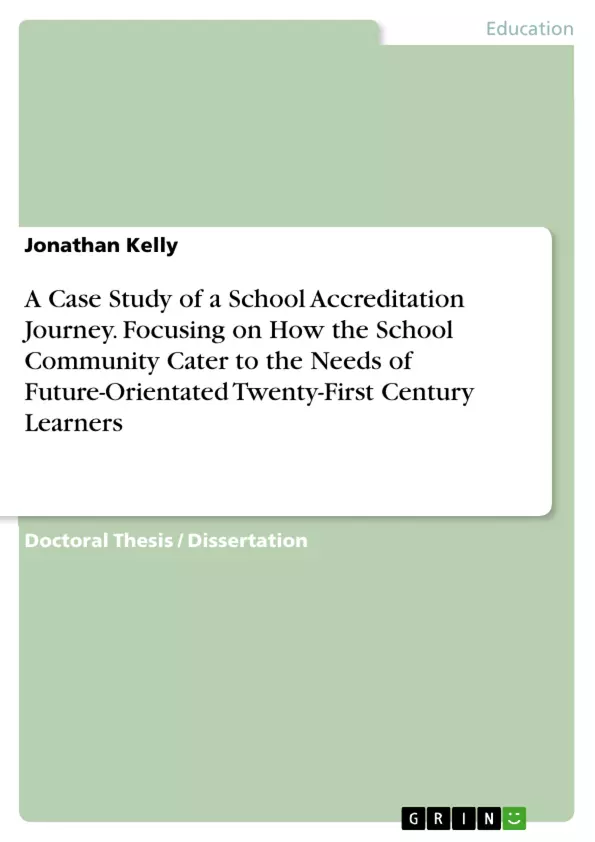In the current literature, there is a lack of research information concerning the impact that the school accreditation process can have, including through the generated insights, and the potential transformational journeys, of a diverse group of stakeholders with a shared purpose. The Research Question of this study is: What is the impact of the NEASC accreditation process on meeting the needs of twenty-first-century students?
The research offers unique insights, via a case study, of an Indian International School undergoing joint accreditation (Council of International Schools, New England Association of International School, and International Baccalaureate).
As this was a case study, the sample size was 5. The researcher, as the school's Head of Design and Technology, and also a foreigner, remains close to the action of the participants, recording different insights of various stakeholders via anecdotal notes, regarding the effects and effectiveness of the accreditation process at the school.
The study's focus is on investigating reflections on participating in an international school's accreditation process. While previous research often concentrated on external stakeholders' perspectives, this study emphasizes the views of internal stakeholders within schools. Unlike studies focusing on enrolment and learning impacts, this research explores the narrative perspective of the benefits of international school accreditation.
Existing studies highlighted positive impacts on enrolment and mobility of programs, but the research community lacks an in-depth exploration of the narrative aspects of accreditation benefits. The researcher, being a stakeholder in the accreditation process, provides an internal perspective, addressing this gap in the literature.
Although researchers have examined international schools over time, a problem that has yet to be addressed regards the insufficient research detailing the benefits of international school accreditation from a narrative perspective. A gap therefore exists both in terms of lack of literature and the adoption of a narrative methodology to solve the problem. Insights from the examination of studies in the field convey that many researchers opt to adopt an external perspective to examine how accreditation processes impact international schools.
Inhaltsverzeichnis (Table of Contents)
- Abstract
- Certification of Thesis
- Acknowledgements
- Dedication
- Chapter 1: Introduction
- The research context
- The research problem
- The research question
- Research methodology
- Ethical considerations
- Significance of the research
- Structure of the thesis
- Chapter 2: Literature Review
- Accreditation systems
- School accreditation and student learning
- Digital transformations in education
- Global trends in education
- Future-oriented learners
- The role of school communities
- Chapter 3: Case Study: Pathways School
- School context and background
- The accreditation process
- Stakeholder perspectives
- Data collection and analysis
- Findings and discussion
- Chapter 4: Conclusion
Zielsetzung und Themenschwerpunkte (Objectives and Key Themes)
This research aims to investigate the impact of the NEASC accreditation process on meeting the needs of twenty-first-century students, specifically focusing on a case study of an Indian International School.
- The impact of the NEASC accreditation process on school improvement.
- The role of school communities in supporting the needs of future-oriented learners.
- The integration of digital technologies in education to enhance student learning.
- The global trends in education and their implications for accreditation processes.
- The perspectives of various stakeholders, including teachers, parents, and school administrators, on the accreditation process.
Zusammenfassung der Kapitel (Chapter Summaries)
- Chapter 1: This chapter introduces the research context, problem, question, methodology, and ethical considerations. It also outlines the significance of the research and the structure of the thesis.
- Chapter 2: This chapter provides a comprehensive review of the literature related to school accreditation, digital transformations in education, and global trends in education. It explores the concept of future-oriented learners and the role of school communities in meeting their needs.
- Chapter 3: This chapter presents a case study of Pathways School in India, focusing on its journey through the NEASC accreditation process. It examines the perspectives of various stakeholders and analyzes the data collected to understand the impact of the process on the school community.
Schlüsselwörter (Keywords)
Key terms and concepts explored in this research include: school accreditation, NEASC, future-oriented learners, twenty-first-century skills, digital transformation, global trends in education, stakeholder perspectives, case study, Indian International School, and school community.
- Quote paper
- Dr Jonathan Kelly (Author), 2023, A Case Study of a School Accreditation Journey. Focusing on How the School Community Cater to the Needs of Future-Orientated Twenty-First Century Learners, Munich, GRIN Verlag, https://www.grin.com/document/1431388



